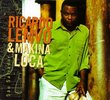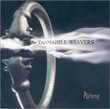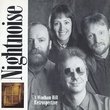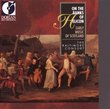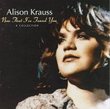| All Artists: Handel, Sixteen, Christophers Title: Samson Members Wishing: 1 Total Copies: 0 Label: Coro Release Date: 1/1/2003 Genre: Classical Style: Opera & Classical Vocal Number of Discs: 3 SwapaCD Credits: 3 UPC: 828021600821 |
Search - Handel, Sixteen, Christophers :: Samson
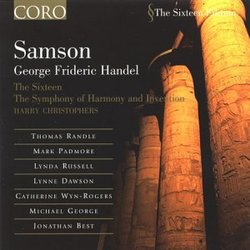 | Handel, Sixteen, Christophers Samson Genre: Classical Samson proved to be one of Handel's most popular oratorios during his lifetime, composed within weeks of Messiah. Thomas Randle sings a commanding title role ("Samson with attitude...: The Independent), with Lynda Russell'... more » |
Larger Image |
CD DetailsSynopsis
Album Description Samson proved to be one of Handel's most popular oratorios during his lifetime, composed within weeks of Messiah. Thomas Randle sings a commanding title role ("Samson with attitude...: The Independent), with Lynda Russell's vocally seductive Dalila, and Catherine Wyn-Rogers' rich and expressive Micah. Samson opens with a pagan festival and closes with an elegy. Its finale is rightly established as one of the most famous arias of all time" "Let the bright Seraphim in burning row/ Their loud, uplifted angel-trumpets blow." Similarly Requested CDs
|
CD ReviewsHANDEL AGONISTES DAVID BRYSON | Glossop Derbyshire England | 03/11/2004 (5 out of 5 stars) "The genesis of Handel's Samson seems to have been a reading of Milton's Samson Agonistes at the home of Lord Shaftesbury in late 1739. It seems that Handel was visibly impressed, as well he might have been. However the actual composition of the work did not begin until after Messiah in 1741, with its premiere in 1743.I doubt that he ever produced a more perfect or a more consistently inspired work, certainly among his compositions of comparable size. Samson is in three acts, each neatly filling one cd. The libretto is by the formidable Jennens, who was famously not intimidated by the great man and who had told him not to mess around with the script in their previous collaboration over Saul. One way or another, it strikes me as one of the best libretti I have ever seen. Milton's general scheme is followed faithfully but not pedantically. Jennens skilfully brings in the hedonistic Philistines right at the start for better stage-effect and musical contrast with the main action, and he expands Milton's abrupt conclusion to provide suitable obsequies, not quite on the scale of Siegfried's but still expansive and incorporating a far better funeral march in my own view, for the hero who smote the enemy and died unwounded by them. The reflective utterances of Milton's impersonal `Chorus' are partly personified into the character of Micah, partly given to what Handel knew as a chorus, and anyone unfamiliar with that has a musical experience indeed in store. The diction is almost entirely free of the affectation and artificiality that bedevilled 18th century English poetry, the `impure verbiage' memorably ridiculed by Housman in The Name and Nature of Poetry. Many of Milton's best phrases and images are incorporated, indeed whole lines are here little altered, sometimes unchanged entirely. When Samson rebuffs Dalila, Milton's epic sentence of 18 lines is adroitly reduced by Jennens to 6, and he removes any ambiguity from Dalila's final departure. As given by Milton I could imagine this delivered either with defiance or with a shrug of the shoulders. With Jennens Dalila turns abruptly into a spitfire, and the opportunity is not lost on the composer.Handel seems to me something of an old testament figure himself. The specifically Christian tone of meditation that is so marked in Bach is totally absent from anything I know by Handel. He is one of the prophets, born out of his time. Oratorio started with him and effectively ended with him so far as I am concerned. Measured against the true epic stuff of Handel, Mendelssohn is the feeble imitation of an excited curate that Shaw uncharitably called him, and when at the end of act II the stars in deep amaze at Jehovah fix'd in His everlasting seat hammer in their piledriver chords across the beat - there He is. Samson seems to have benefited from the time the composer took over it - I detect none of the signs of haste that I do in Messiah. One glorious and extended aria follows another, the recitatives show some of the variety and inventiveness of those in Messiah itself, and in the choruses, sung by 20 voices, I heard, as nearly always, the incomparable build of tone that Beecham described as not even remotely rivalled by any subsequent composer. This type of performance is not the only kind I can imagine, but it suits me very well. No doubt an extra dimension of vividness and force would have been added if it had been Robert Tear, Jill Gomez and Tom Allen in the main parts, but by the second time of hearing I had stopped thinking about them entirely, even if I would still have welcomed a rather more heroic reading of the title part itself. The soloists here are out-and-out professionals obviously in their complete element with this music, and the 20-strong choir revel in the marvellous material they are given time after time repeatedly. The instrumentalists put me at my ease right away in the very attractive overture, there is some formidable virtuoso work by the violins, the incomparable Crispian Steel-Perkins gets his head in the final `Let the Bright Seraphim', and the dead march which Handel on second thoughts imported from Saul in place of his original inspiration is awesome as ever, taken faster than Mackerras or Ledger take it in my versions of that masterpiece, and with a memorable timpani effect. Anyone contemplating a purchase would probably do well to consider the versions by Leppard and Harnoncourt also, indeed anyone with the time and money might well decide to obtain all three. Had I but world enough and time I might have done exactly that. For now I shall stick very happily indeed with what I have here." One of Handel's best oratorios Bruce Bogin | rural France | 12/03/2004 (5 out of 5 stars) "Some time ago I fell in love with baroque music, particularly sacred music. Then I discovered Vivaldi's operas but for some reason I put off buying anything by Handel. Then one day Amazon France had a special on Belshazzar. I bought it and I was hooked. Since then I have acquired a number of Handel's operas and oratorios. I have just acquired Handel's Samson performed by Harry Christophers and The Sixteen and stars Thomas Randle, Mark Padmore and Lynda Russell. It is a stunner. The music and particularly the choruses is vigorous and exciting. I love unequivocally all of Handel's music (I only buy and listen to vocal music) and it is uniformly great, but Samson outdoes all of them. I read somewhere that Beethoven said referring to Handel "I would take off my hat and kneel at the grave of this man, the greatest composer of them all." Samson is great music. Do yourself a big favor and buy it." A comparison between Harry Christophers' and Raymond Leppard E. A. Lovitt | Gladwin, MI USA | 06/11/2009 (5 out of 5 stars) "This Coro (C) edition of Handel's "Samson" with The Sixteen and Harry Christophers already has a very fine review, so my own comments will be limited to a comparison between this version (2002) and an earlier (1978) recording from Erato (E), with Raymond Leppard conducting the London Voices and the English Chamber Orchestra (Handel - Samson / Tear · J. Baker · Watts · Shirley-Quirk · Luxon · Langridge · A. Oliver · Burrowes · Lott · ECO · Leppard).
* Harry Christophers and his period-instrument orchestra (C) provide a brighter, more nimble performance that is about seven minutes shorter than Leppard's version (E). Raymond Leppard gives us a more majestic, operatic "Samson" that could seem slightly ponderous to modern tastes. * The quicksilver melismas of The Sixteen (C) are a joy, their precise articulation a rare gift to the serious listener. However, the choral duel between the Israelites ("Jehovah!") and the Philistines ("Great Dagon!") is better suited to the volume of the London Voices (E). The Sixteen (C) sound more like a Cambridge debating society than a mob of religious zealots. Many of Handel's choruses in "Samson" require majesty rather than nimbleness, e.g. "With thunder arm'd great God, arise!" The Sixteen (C) make better Philistines. The London Voices make better Israelites! * The soloists of both recordings are excellent, although the Erato (E) edition has better-known names, e.g. Dame Janet Baker as Delilah and Benjamin Luxon as Harapha. The real difference lies in the role of Samson. Thomas Randle (C) sings a beautiful, technically perfect Samson. Robert Tear (E) is Samson. Tenor Tear conveys the rage, power, and despair of this biblical hero. The thunderous interchanges between Samson and Delilah ("Traitor/Traitress to love!"), Harapha and Samson ("Presume not on thy God") come across much more emotionally in the Erato (E) recording. I also prefer alto Helen Watts (E) in the rather ambiguous role of Micah. Her expressive singing brings this character to life for me, especially in the poignant "Return, oh God of hosts! Behold thy servant in distress!" Dame Janet Baker (E) is a peerless Delilah. * Harry Christophers (C) substitutes the "Dead March" from "Saul" (as eventually did Handel), while Raymond Leppard (E) uses the original "Dead March" from "Samson" in his recording. I love both of these recordings of "Samson," but the version I listen to most often is the Leppard (E). " |

